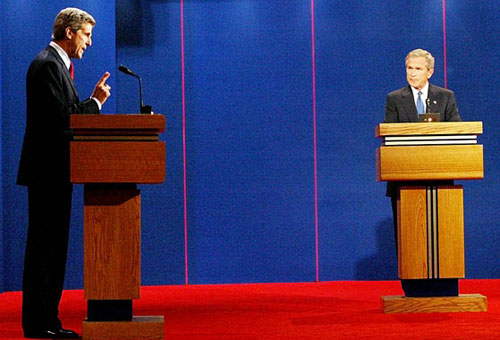James White responds to the Challenge, sort of
A pound of misunderstanding and irrelevance together with a little pinch of relevant but inadequate response.
A pound of misunderstanding and irrelevance together with a little pinch of relevant but inadequate response.
As we all know, the ideal medium for theological debate is a music video posted on youtube. In the past, we’ve seen the mighty Winterband strking a blow for Oneness Pentecostalism. Trinitarians rapped back with some impressive rhymes. Now, unitarians enter the fray. If I had to pick a theology based solely on the musical quality of these entries (which of course is a great… Read More »Trinity vs. Oneness vs. unitarianism Youtube shootout
In round 1, Burke explains that he’s a biblical unitarian, not a “rationalist” or “universalist” unitarian. Further, he confesses that: Jesus Christ is the Son of God, but not God himself and The Holy Spirit is the power of God, but not God himself. Further, The Bible is the inspired Word of God and the sole authoritative source of Christian doctrine and practice. He neither… Read More »SCORING THE BURKE – BOWMAN DEBATE – Burke 1
Here’s a sermon by my friend Pastor J. Dan Gill, expounding the important New Testament theme of the exaltation of Jesus. He discusses texts including Psalm 110 and Acts 2. You can download the audio of this sermon here. Dan and his wife Sharon run the 21st Century Reformation website, an important resource for biblical unitarians (aka unitarian Christians, one God believers, non-trinitarian Christians). Their… Read More »Pastor J. Dan Gill on the real Jesus
In this episode, the final half of my debate with Roman Catholic apologist Mr. William Albrecht. The question: was Tertullian a trinitarian? (Part 1 is here.) First, we take turns cross-examining one another, and then the closing arguments. I’ve shortened the audio here, but have not cut any meaningful content at all. Who makes the better case? As Fox News says, we report, you decide.… Read More »podcast 34 – Albrecht vs. Tuggy debate – Was Tertullian a trinitarian? Part 2
Wheeeeee! Everything is “Trinitarian” now.

“All we need is one substance to cure the ills of our society!” “I have personal experience with substance abuse, and it is wrong.”
Before I start a mini-series on the Trinitarian thought of Henry of Ghent, I thought it would be good to offer a brief survey of the late 13th c. landscape. This is way too brief and fairly focused, but hey, you’ve got to start somewhere. As the scholastics would say, you cannot will to do something, unless you have some sort of knowledge. No voluntary action without knowledge, however imperfect or confused that knowledge is! (As an aside: Jean-Luc Marion, a contemporary philosophical-theologian and former student of Jacques Derrida contests this medieval Aristotelian claim, and argues that acts of will –i.e. to love- does or can precede any knowledge.)
Of all the issues to discuss about the Trinity the one at hand here is the question: what causes or explains why the divine persons are really distinct from each other? We know there are three persons, and one ‘substance’/’ousia’ from Scripture and our orthodox Creeds, but is there anything that we could say that might account for why there are three, and not say five divine persons? Or even, why not say there is a potential infinity of divine persons (on some contestable account of the deification of believers)? You get my point. Why three divine persons and what makes it that there are three, no more and no less?
Dale’s Swinburne Trininty chart, version 2.0. (or 1.1 – whatever) Thanks to reader (and Swinburne student) Joseph Jedwab for the correction. He points out: [Swinburne] wants to avoid the idea that the Spirit’s existence is causally overdetermined [i.e. that it has two complete causes, either of which would alone suffice]. But he also wants to avoid the idea that each actively only partly causes the… Read More »Swinburne’s Social Trinitarian Theory, Part 4 – the cooperation involved in procession or spirating
 “You’re another” – that’s what tu quoque means – it’s the name of an informal fallacy, often called a fallacy of relevance. For example, if I argue that your theory is self-contradictory, suppose you retort that my theory is too. Well, so…? It’s irrelevant to the point that the first theory mentioned is self-contradictory (so, self-refuting).
“You’re another” – that’s what tu quoque means – it’s the name of an informal fallacy, often called a fallacy of relevance. For example, if I argue that your theory is self-contradictory, suppose you retort that my theory is too. Well, so…? It’s irrelevant to the point that the first theory mentioned is self-contradictory (so, self-refuting).
Cornell grad student Chad McIntosh argues that if the social trinitarian God – or rather: the three divine persons posited by clear “social” Trinity theories – would be deceivers, then so would the perfect self in whom I believe, being a unitarian Christian. So granting that an ST is implausible, for similar reasons unitarian Christian theology is implausible (because it has a perfect being doing what appears a wrongful deception).
Is this a defense of ST?
I’ve already argued in that paper than a Swinburne-type ST implies what looks like wrongful deception by at least one of the three divine persons. This hasn’t been disputed.
I don’t grant that if God is a single self, then Read More »You’re another!
God can’t be “perfect in love” unless he is multipersonal?
Here is a guest post by Sir Anthony Buzzard. In it, he discuses what many would consider an obvious point, though some ignore or deny it: that the theology of Bible-era Judaism is monotheistic in a way that implies that the one God just is a certain mighty self. In Mark 12, Jesus simply affirms that theology. It is standard information in all the… Read More »Jesus’s Jewish error?
Steve Hays has posted on my critiques of purely philosophical arguments from theism to the Trinity.
The real question, I think, is whether or not this idea about “God” is consistent with biblical teaching.
Dallas Willard is one of my favorite authors, and I don’t normally go in for criticizing what he writes. But I found a great example in this (good) book (p. 122) of an idea that is fairly widespread, and which underlies a lot of social trinitarian speculation. This brief passage got me to thinking. He says, …God is love and sustains love for us from… Read More »Are persons essentially relational?
“What bothers me most is the rhetorical move you’re making with this claim that everyone before Nicea (or so) was a ‘Unitarian.'”
Which parts of Channing’s thought do and don’t hold up today?
At the Journal of Analytic Philosophy, and at the Journal of Biblical Unitarianism. Thanks to the editors of both journals for their good work. The first paper continues the discussion with Hasker of my “Divine Deception” arguments against three-self Trinity theories. I discuss there the monotheism of Isaiah. Then I get into interesting arguments by historical unitarians, such as Nye, Clarke, and Worcester, even comparing… Read More »two new papers published online
Dr. Lee Irons on his contribution to the new book The Son: Three Views of the Identity of Jesus, interview by Dr. Dale Tuggy for episode 117 of the trinities podcast.
An apologist tries to tag unitarian Christians with some unwelcome words.